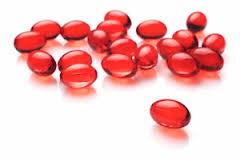In a perfect world, you would be able to get all of the omega-3s you need by eating fish. Unfortunately, less than 10% of adult Australians eat the required level of fish in their diet.
Unlike fish oils, krill oil carries omega-3s in the form of phospholipids that deliver the omega-3s directly to your body’s cells. Standard fish oils contain omega-3 fatty acids in the less absorbable form of free triglycerides. Krill oil is 55% more absorbed than those in standard fish oil.
It’s fairly obvious then that krill oil is an alternative source of omega-3, which research shows can be even more effective in heart health and arthritic symptoms.
Krill are small, shrimp-like crustaceans, about one to six centimetres in length, predominantly found in Antarctic waters. Krill is a zooplankton found at the bottom of the food chain. Even though krill is the main food source for whales, it remains the most abundant biomass on earth because of its high regeneration properties. The krill used is harvested in the Antarctic Ocean where the worldwide quota harvest is less than 0.1% the allowed fishing quota. Being at the bottom of the food chain, having a very short lifespan one or to two years and living in the clean waters of the Antarctic Ocean, makes the krill oil naturally pure from heavy metals, dioxins and pesticides.
It’s the way that the omega-3s are “packaged” which makes the difference. Instead of being associated with triglyceride, krill oil fatty acids are largely associated with phospholipid.
I have been particularly interested in the effects of krill oil on C-reactive protein (CRP), which is a strong predictor of future cardiovascular events. This prediction includes the risk of myocardial infarction, stroke, sudden death from cardiac disease and peripheral arterial disease. In arthritic joints, C-reactive protein production reflects the release of pro-inflammatory factors responsible for cartilage degeneration. C-reactive protein is significantly increased in patients with rheumatoid arthritis, and also in patients with osteoarthritis.
More especially, I’m very concerned about the increasing evidence of adverse events related to the chronic use of non-steroidal anti-inflammatory drugs (NSAIDs). NSAIDs represent the gold standard for the treatment of chronic inflammatory conditions and it is imperative to research for more innovative and safer treatments. Even as recently as last week, experts are calling for diclofenac, marketed here as Voltaren, to be removed from the government subsidized and taxpayer funded Pharmaceutical Benefits Scheme. These experts claim that diclofenac risks far outweigh the benefits, based on all the available evidence.
Krill oil can significantly reduce inflammation, pain, stiffness and functional impairment associated with osteoarthritis and rheumatoid arthritis.
Krill oil is a rich source of unique phospholipid carriers of omega-3 fatty acids, eicosapentanoic acid (EPA) and docohexanoic acid (DHA), esterified on antioxidants, as astaxanthin and a novel flavonoid. Phospholipids are important in protecting membranes from toxic injury and free radical attack. The composition of phospholipids in krill oil appears to be optimal to offer such protection. The unravelling of the exact mechanism of action is a multifactorial project which is still underway. The significantly dominant omega-3 to omega-6 ratio (15:1) in krill oil may partially explain the anti-inflammatory effects. The balance of polyunsaturated (essential) fatty acids in the body is critical for the maintenance of healthy cell membranes and hormone regulation.
The balance between omega-3 and omega-6 fatty acids is important. When long-chain omega-6 fatty acids predominate in the phospholipids of cell membranes, the production of pro-inflammatory substances is encouraged. The presence of omega-3 fatty acids promotes the production of anti-inflammatory substances.
The association between phospholipids and long-chain omega-3 fatty acids facilitates the passage of fatty acid molecules through the intestinal wall, increasing bioavailability and ultimately improving the omega-3:omega-6 ratio.
I recommend to my patients that they use krill oil to significantly lower their cholesterol levels. It helps to reduce LDL-cholesterol (bad cholesterol) and increase HDL-cholesterol (good cholesterol). HLD-cholesterol has an important role in reducing LDL-cholesterol.
In another development, numerous studies have shown a beneficial effect of omega-3 fatty acids on menstrual pain. This is consistent with the fact that menstrual pain and cramps are caused by inflammation mediated by omega-6 fatty acid-derived eicosanoids.
The effectiveness of krill oil on emotional menstrual symptoms may be based on potential modulating effects on neurotransmitters that affect emotional and psychological symptoms. The synergistic effects of omega-3 fatty acids and phospholipids are specific to krill oil.
May I also reassure you that the harvesting of krill oil from the world’s oceans is carefully monitored, and strict guidelines are enforced. The whales are safe, there’s plenty of krill to go around, and in fact, the pressure on fish stocks might be lightened.


3 Responses
Bryan Parkinson
Hi Gerald. Which krill product do you prefer and can you pls provide the address of your pharmacy.
Regards
Bryan
Lynette Drews
Hi Gerald, I have been taking Krill capsules for 3 weeks now for arthritis in my hands especially, but to date can notice no change. How long before I do not feel pain? I also suffer terrible cramp all over my body, mostly at night and am taking magnesium. Unfortunately this gives me diarrhoea. Any advice would be appreciated. Thank you.
Lynette Drews
Hi Gerald, I have been taking Krill capsules for 3 weeks now for arthritis in my hands especially, but to date can notice no change. How long before I do not feel pain? I also suffer terrible cramp all over my body, mostly at night and am taking magnesium. Unfortunately this gives me diarrhoea. Any advice would be appreciated. Thank you. Have not asked before!